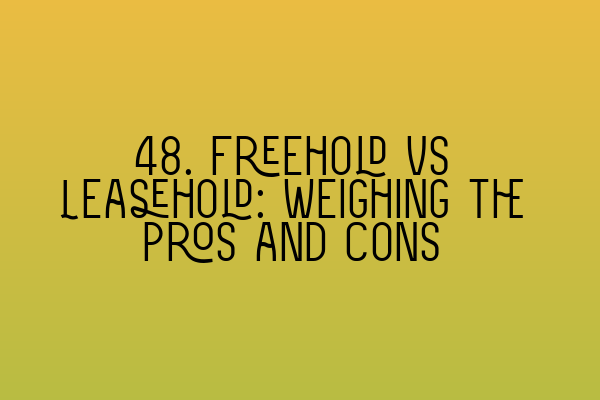48. Freehold vs Leasehold: Weighing the Pros and Cons
As a leading property law firm, SQE Property Law & Land Law understands the importance of having a clear understanding of the different types of property ownership. One of the fundamental distinctions to consider when purchasing a property is whether it is freehold or leasehold. In this blog post, we will explore the pros and cons of both types to help you make an informed decision.
Freehold Ownership:
Freehold ownership is the purest form of property ownership. When you buy a property on a freehold basis, you gain full ownership rights over both the property and the land it occupies. Here are some of the advantages and disadvantages of freehold ownership:
Pros:
1. Ultimate ownership: With a freehold property, you have complete control and ownership over the property and the land it sits on. This gives you the freedom to make decisions about alterations and improvements without seeking consent from a landlord or management company.
2. Potential for investment: Freehold properties often hold their value well and can be a solid long-term investment. You have the flexibility to rent out the property or sell it at any time, giving you the potential for a significant return on your investment.
3. No ground rent or service charges: Unlike leasehold properties, freehold properties do not require payment of ground rent or service charges to a landlord or management company. This can save you money in the long run, as these additional costs can add up over time.
Cons:
1. Responsibilities for maintenance: As the sole owner, you bear full responsibility for the maintenance and repair costs of the property. This means you will need to budget and plan accordingly to cover any unforeseen expenses that may arise.
2. Limited shared amenities: Some freehold properties, particularly houses, may have limited access to shared amenities such as gymnasiums, gardens, or communal spaces. If access to these facilities is important to you, you may need to consider alternative options.
Leasehold Ownership:
Leasehold ownership, on the other hand, involves owning a property for a fixed period of time, typically between 99 and 999 years, while the land remains under the ownership of the freeholder or landlord. Let’s explore the pros and cons of leasehold ownership:
Pros:
1. Shared responsibility for maintenance: In a leasehold property, the responsibility for maintenance and repairs is often shared with other leaseholders through a management company or landlord. This can be favorable as it distributes the financial burden and can provide access to specialist services for upkeep and maintenance.
2. Access to shared amenities: Leasehold properties often come with shared amenities such as gardens, gyms, or parking spaces. These facilities are usually maintained and managed by the landlord or management company, giving you the benefit of access without the burden of maintenance.
3. Lower upfront cost: Leasehold properties generally have a lower upfront cost compared to freehold properties. This can make them more affordable, especially for first-time buyers or those on a tight budget.
Cons:
1. Leasehold charges: Leasehold properties often require payment of ground rent and service charges to the landlord or management company. These charges can increase over time and need to be factored into your budgeting.
2. Restrictions and consent: As a leaseholder, you may need to seek consent from the landlord or management company for alterations or improvements to the property. This can limit your freedom of choice and potentially delay any plans you may have.
3. Lease length: Although most leases are long-term, it’s important to be aware that once your lease expires, ownership reverts back to the freeholder. In some cases, lease extensions can be costly, and you may need to negotiate with the freeholder or landlord to extend the lease.
Making the Right Choice:
When deciding between freehold and leasehold ownership, it’s crucial to consider your own circumstances, priorities, and budget. If you value complete ownership and autonomy over your property, freehold might be the better option for you. However, if you are looking for shared responsibility, access to amenities, and a more affordable upfront cost, leasehold could be a viable choice.
At SQE Property Law & Land Law, we have extensive experience in assisting clients with their property transactions. Our team of expert solicitors can guide and support you throughout the process, ensuring you make the right decision based on your unique circumstances.
For more information on property law and the SQE exams, check out our related articles:
– SQE 1 Practice Exam Questions
– SQE 1 Practice Mocks FLK1 FLK2
– SQE 2 Preparation Courses
– SQE 1 Preparation Courses
– SRA SQE Exam Dates
Remember, the choice between freehold and leasehold ownership is an important one, so take your time, seek professional advice, and make an informed decision that will suit your needs and financial situation in the long run.
